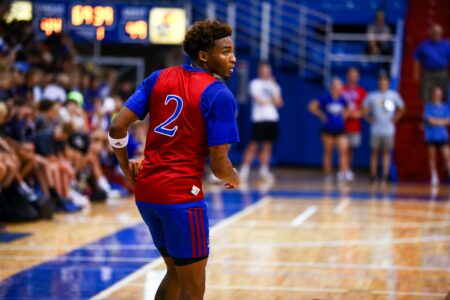Self responds to article’s citations
KU coach sees 'nothing remotely wrong' with hiring high school and AAU coaches for camps
The Dallas Morning News on Sunday cited Kansas University, the University of Texas and Texas A&M as three schools that pay high school and AAU coaches of prospective players for speaking at their summer camps.
It is not against NCAA rules to bring in prep and AAU coaches of high profile players to work such camps.
Examples cited by the Morning News:
l KU coach Bill Self in the summer of 2005 paid Darrell Arthur’s high school coach, James Mays, as well as Dallas-area summer league coaches Jazzy Hartwell and Wes Grandstaff, $2,000 apiece to speak four times at Self’s camp.
KU also paid $2,000 fees to Mike Bethea, Aubin Goporo, Anthony Longstreet and Larry Butler, coaches of KU players C.J. Giles and Rodrick Stewart, Sasha Kaun, Sherron Collins and Julian Wright.
l Texas coach Rick Barnes paid a Nacogdoches High coach $3,200 to work his camp. Nacogdoches is the alma mater of UT player Damion James.
l A&M coach Billy Gillispie paid three members of last year’s coaching staff at Seagoville High $3,015 to work the Aggie camps, including $1,790 to former head coach Robert Allen.
Seagoville seniors Derrick Roland and Donald Sloan signed with the Aggies last November. Roland and Sloan also played for the summer league Dallas Mustangs, who have had representatives work A&M camps.
In each case, the coaches involved said there were no promises to deliver a signee.
“I would think that probably most people do the same thing that we do,” A&M coach Billy Gillispie told the Morning News. “You should try to staff a camp (without them).”
“I know I am where I am today because of the experiences I had and the contacts I made my first three years (when he entered the profession),” Barnes shrugged.
Contacted by the Journal-World, Self said he did not believe the article painted his program in a bad light.
“I don’t see how it would make anybody look bad if you are operating your program within the rules, which we are,” Self said.
“The NCAA has a pretty thick rulebook. Your job is to stay within that and do things that give you the best chance to run a first-class program within the letter of the law. That’s what we’re trying to do.
“Having outside speakers in camp enhances our camp, which is pretty big business,” he explained. “We have one of the premier camps. It gives you a chance to build relationships with the (prospects’) coaches, not through monetary means, but it means spending quality time with them.
“If it was against the rules, we wouldn’t do it,” Self said. “We run everything through compliance and always have.”
Self said college coaches had been bringing in coaches of prospects since his days at Oral Roberts, Tulsa and Illinois.
“If you really understood the business … there would always be a crossover between speakers and coaches with potential prospects,” Self said. “There have been just as many or more speakers at our camps throughout the years that we did not sign their players.”
Self said he saw no reason for the NCAA to legislate against paying coaches of blue chip high school prospects to work camps.
“I do not see how you could do that, dictate who can or cannot speak,” Self said. “I see nothing remotely wrong with it. I can’t believe you would discriminate against coaches because they have potential good players – that if coaches had good players they cannot speak. It’s something that’s gone on for many years, and I’m sure it’ll continue going on. It enhances the camp. It’s not done strictly for recruiting.”
Self said if the NCAA deemed it illegal, he would abide.
“It’s like years ago, (college) teams used to play AAU coaches’ teams for years (in exhibitions for up to $50,000 guaranteed money) and that was made illegal two years ago.”
Self responded to the Morning News, indicating none of the other 175 camp employees (besides coaches of prospects) earned more than $600 per session at Self’s camps.
“We bring in people to speak just like I’m sure private companies do. I’m sure a private company might bring in somebody from the outside to speak about the industry, and that person would receive more than the current employees are making.”
UT’s Barnes said the only change he would like to see is placing a cap on camp salaries. Currently, a school is free to pay what it wants as long as everyone doing the same job earns the same amount.
“Then people can’t play people off against the other,” Barnes said.







